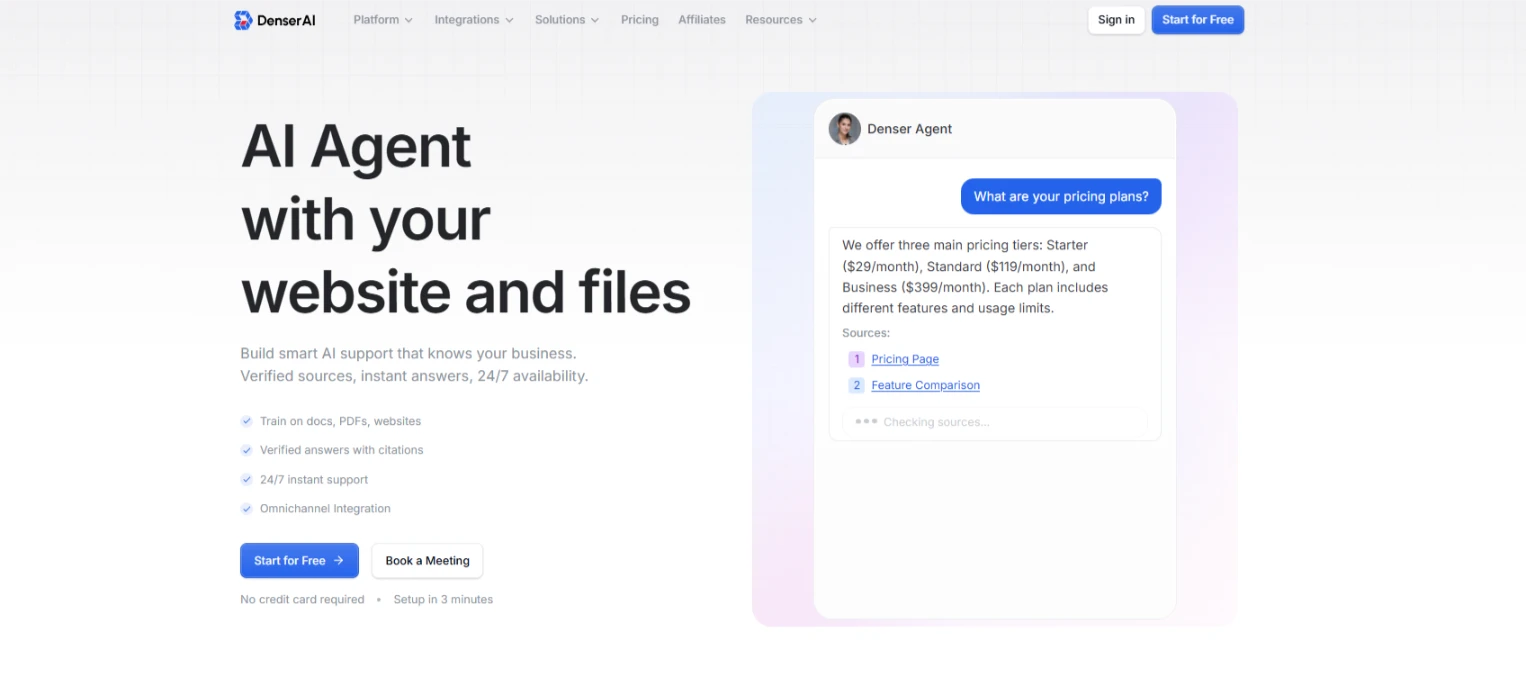
5 Best AI Agent Tools That Speed Up Building AI Assistants

Artificial intelligence has come a long way from simple chatbots and predictive models. AI agent tools can function and adapt in real time, almost like virtual assistants working alongside your staff.
Traditional AI can forecast sales or provide canned responses, but AI agents can manage full processes end-to-end.
This change is valuable for every type of business. Small companies can save time and make better use of limited resources, while large enterprises can expand operations without losing efficiency.
In this article, we will explore how AI agent tools compare to traditional AI, where they’re making the biggest impact across industries, and which platforms are leading the way in 2025.
AI Agent Tools vs. Traditional AI Tools#
Standard AI tools are usually built for a single, defined purpose. They can predict sales, generate analytics reports, or recommend products based on past data.
They work well within their limits, but they’re not flexible. If something changes, you often need to adjust the system or step in yourself to keep it useful.
AI agent tools don’t just analyze but also take action. Instead of stopping at insights, they can plan steps, carry them out, and adjust along the way.
For example, a basic chatbot might give a canned response to a shipping question. The best AI agent can check the order status, update the record, email the customer, and notify your team.
The choice between the two depends on your goals. If you only need a reliable way to handle a single task, traditional AI may be enough.
But if you want adaptable systems that connect across departments and automate entire workflows, AI agent tools are the better fit.
5 Best AI Agent Tools In 2025#
From handling customer inquiries to orchestrating multi-step processes, AI agents can free your team from repetitive tasks and deliver results around the clock.
Below, we’ll explore five of the best AI agent tools so you can determine which fits your business needs.
1. Denser#
Denser is an enterprise-focused AI agent builder known for its easy deployment of custom support bots and virtual assistants. It allows you to create intelligent chatbots that can be trained on your company’s data, documents, and knowledge bases.

Its no-code chatbot platform lets you get an AI support agent live on your site within minutes.
The agent responds with verified answers from your content using retrieval-augmented generation (RAG). It also cites the source documents in its replies, so it's easy to describe where the information came from.
Denserbot can confidently handle FAQs, guide users through processes, or book appointments via automation tools, all while providing fact-backed answers drawn from your data.
One of Denser’s standout AI capabilities is its integration flexibility. The agent can be deployed across multiple channels, so customers receive consistent help wherever they engage.
You can also connect it with external apps like e-commerce platforms and cloud drives to pull internal info. While it handles routine queries and repetitive work, your human staff can focus on complex issues, improving overall support quality.
Imagine the efficiency gains of having an agent that keeps improving and delivers reliable support around the clock. Request a product demo or sign up for a free trial with Denser today!
2. AgentGPT#
AgentGPT is an open-source platform that lets you configure and deploy custom autonomous agents from your browser. You give an agent a name and a goal, and AgentGPT will automatically break the objective into subtasks and start executing them sequentially.
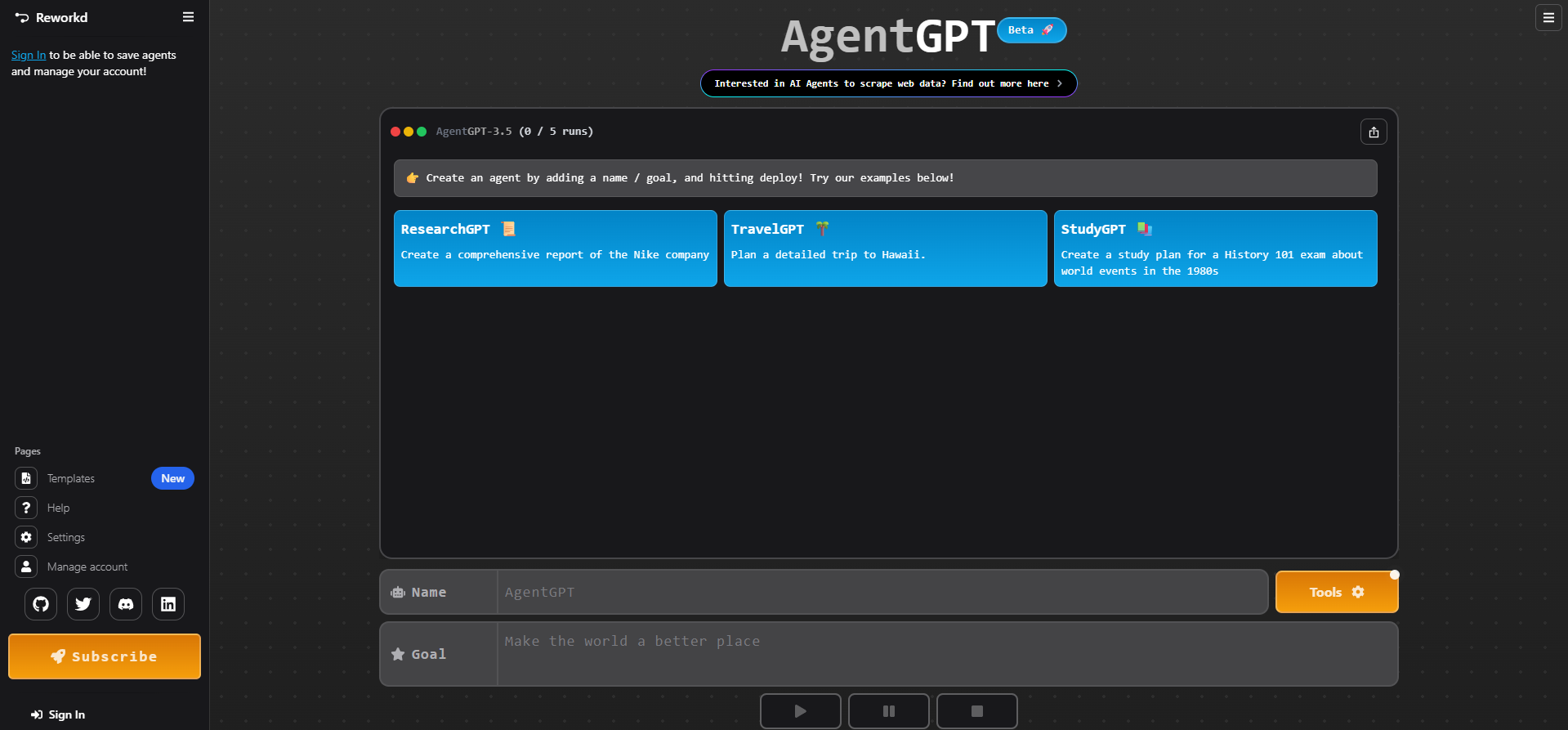
Image Source: agentgpt.reworkd.ai
It uses large language models to perform tasks such as research, planning, or content creation without constant prompts. The interface is simple, and you can drag and drop goals into place to get started.
AgentGPT offers free and paid options. The free tier lets you run a limited number of agent tasks per day (5 runs with basic GPT-3.5) for trying it out.
Upgrading to the Pro plan (around $40/month) unlocks more daily agents, access to more powerful models, web access for research, and plugin integrations.
3. AutoGen#
AutoGen is an open-source agent framework from Microsoft Research designed for developers who want to create advanced multi-agent systems. It's a Python library with .NET support that gives you granular control to orchestrate how AI agents interact and collaborate on tasks.
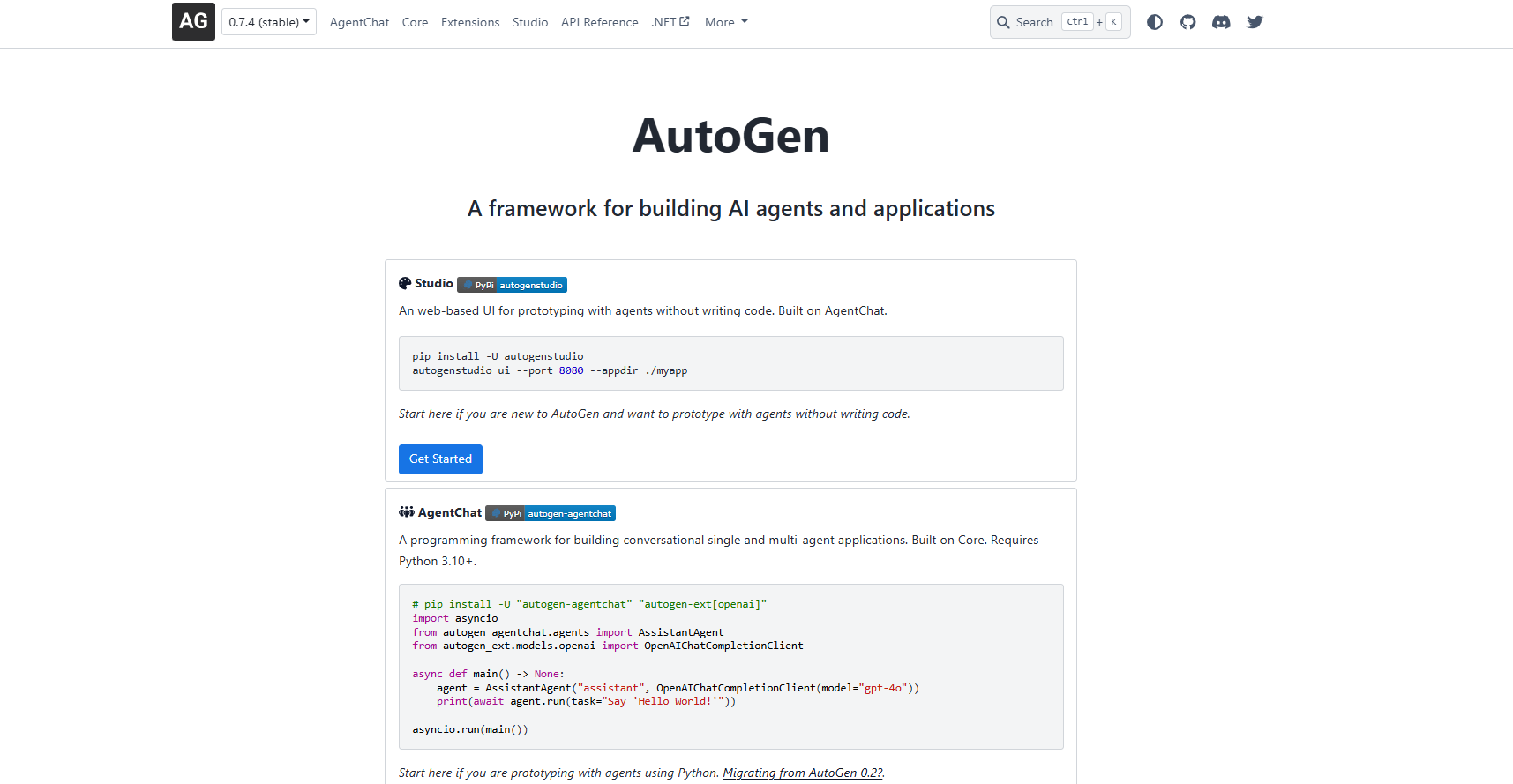
Image Source: microsoft.github.io
The platform allows you to define multiple agents with different roles and facilitates their communication to solve problems together. AutoGen supports sequential flows as well as dynamic, asynchronous messaging for complex tasks.
Because AutoGen is a developer toolkit, it integrates into your existing tech stack rather than being a standalone UI. You write Python code to configure agents, define their skills or prompt templates, and register any external systems or functions they can call.
But, as a low-level framework, AutoGen is geared toward experienced developers. There is a learning curve to set up the agents and understand concepts like event loops and agent managers.
4. LangChain#
LangChain is a software framework for developers building applications powered by large language models (LLMs). It provides modular components to chain together prompts, models, and tools into AI workflows.
With LangChain, you can construct an agent that chats and remembers past interactions, queries databases, calls external APIs, or uses Python code with a few lines of code.
Its key features include an extensive library of integrations and memory management for maintaining conversational context.
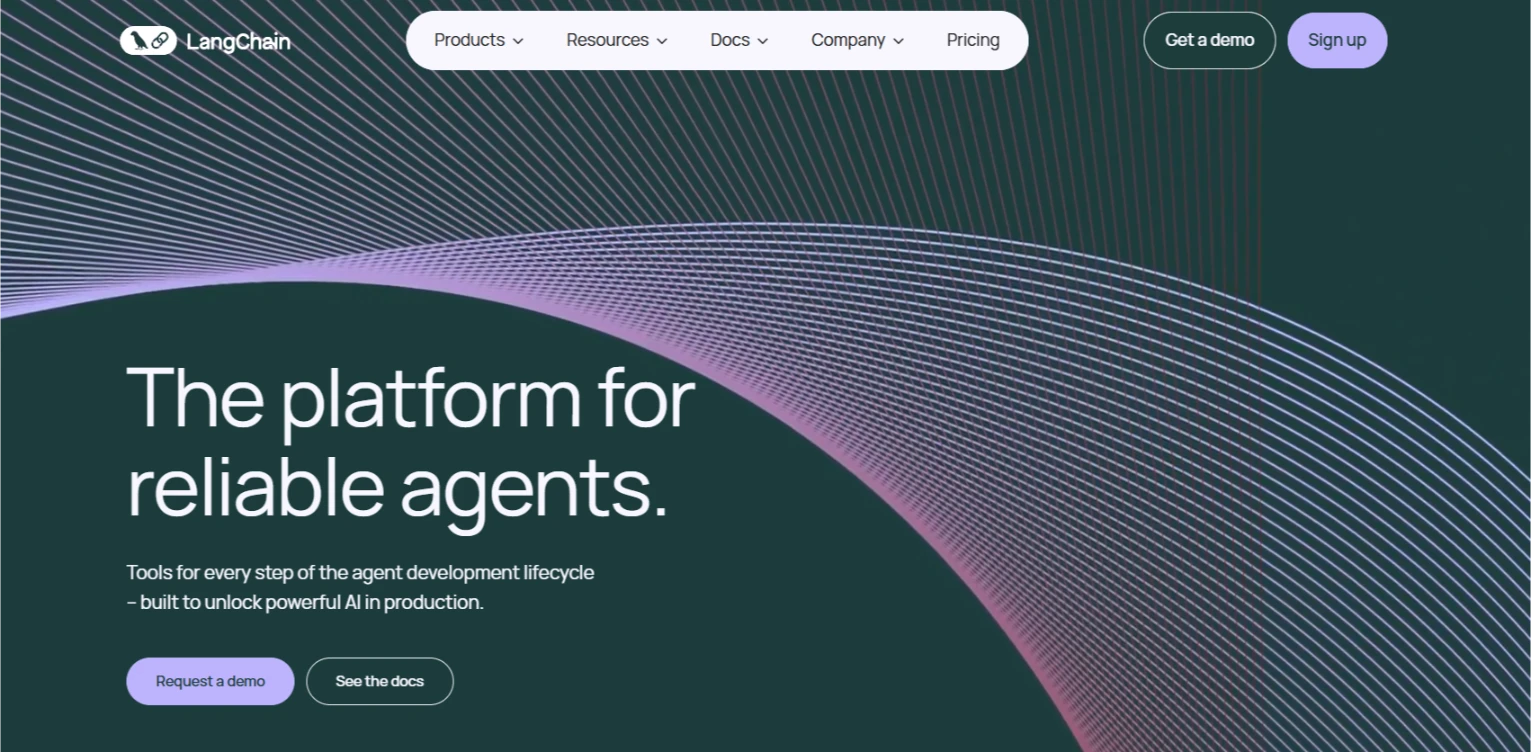
Image Source: langchain.com
LangChain offers LangSmith for experiment tracking and LangFlow/LangGraph, which is a visual editor for designing agent flows.
However, new users sometimes find it overwhelming due to the number of modules, options, and improved features. As one user noted, it’s quite difficult to maintain stability on a project when the underlying library is changing fast.
Another drawback is that despite improved documentation, parts of it remain scattered or skewed towards advanced use cases, which can make the initial learning curve steep.
5. CrewAI#
CrewAI is a multi-agent automation platform that enables AI teams to collaborate on tasks. You don’t just deploy one agent, but a group of AI crew, each with defined roles and tools.
It provides an open-source framework and a cloud platform with a visual editor called Crew Studio for designing agent flows without coding. It supports role-based agents that can be assigned specific tasks.
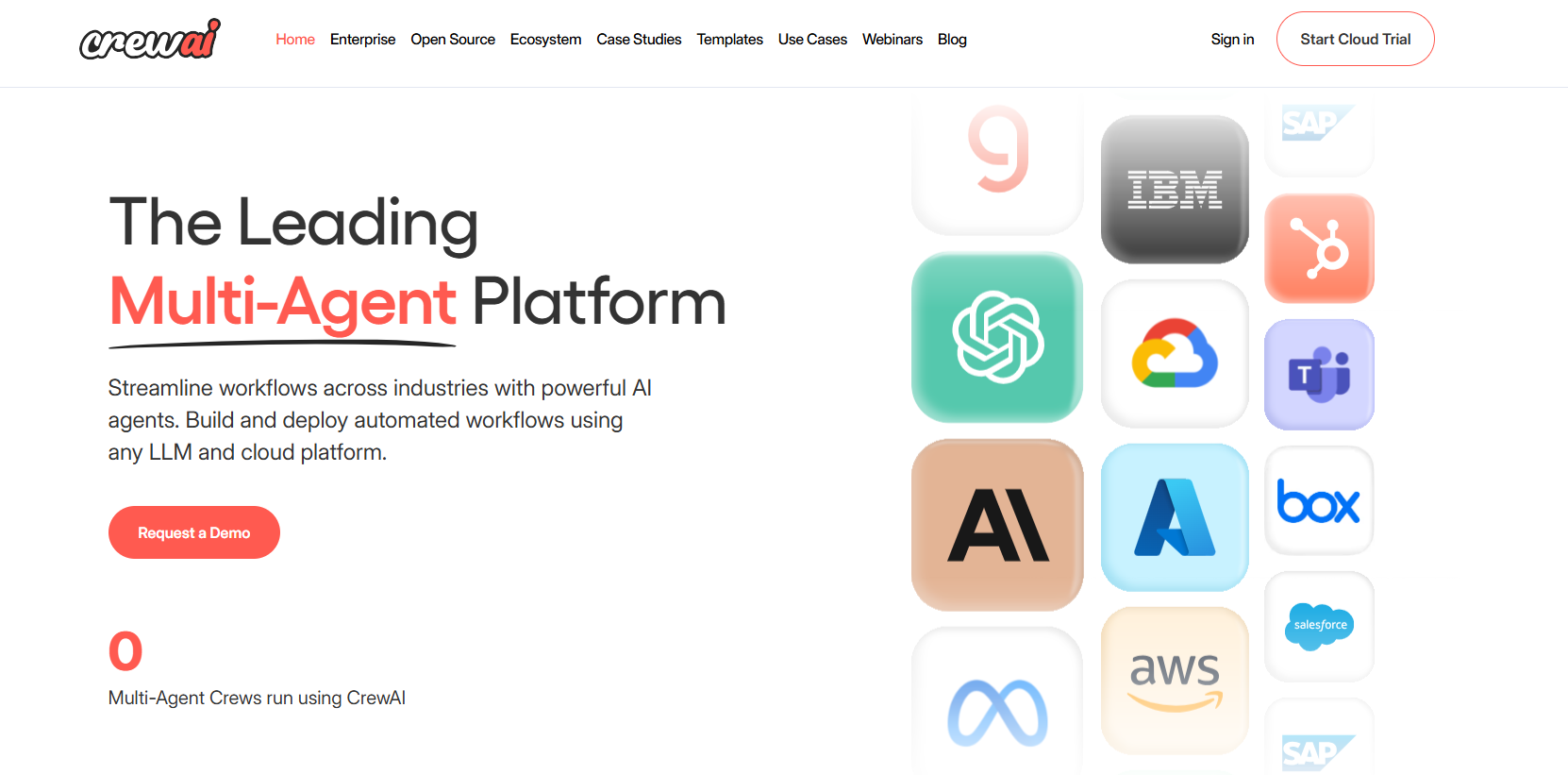
Image Source: crewai.com
CrewAI supports over 1,200 app integrations, so your AI agents can interface with services like Slack, CRM systems, databases, or any other external systems your business uses. It provides a planning module, deployment options, and monitoring dashboards to track each agent crew’s performance.
But, if you opt for the open-source route, be aware that it’s built in Python and requires some DevOps knowledge to set up.
Also, designing an effective multi-agent workflow can take more effort than a single bot. Some early adopters have said CrewAI can feel overkill for 90% of use cases. If a simple chatbot can do the job, setting up an entire crew might be unnecessary overhead.
Use Cases of AI Agent Tools in Different Industries#
To show you what that looks like in practice, let’s break down how different industries are already using various types of AI agents.
AI Agent Tools in Customer Service#
Customer expectations have changed, and they want instant answers at any time of day.
Instead of leaving your customers waiting on hold, AI agents for customer service can respond immediately, handle FAQs, and resolve customer support tickets without tying up your team.
An agent can pull information from your databases, check order status from your ecommerce platform, or send updates through Slack to your sales team.
Because they can connect with other systems, you’re delivering solutions in real time. It also reduces the cost per inquiry and has fewer bottlenecks in daily operations, making it a great tool for modern businesses.
AI Agent Tools in Finance#
AI agent tools have become central to fraud detection, risk management, and investment analysis. Financial institutions process vast amounts of data from various sources, and traditional systems often can’t keep pace.
AI is used in fintech to provide continuous monitoring, detect unusual behavior, and flag risks in real time. Beyond security, they can perform complex tasks like portfolio analysis, scanning market news, or running instant risk models that deliver insights far faster than manual methods.
Recommended Reading#
10 AI Use Cases in Financial Services You Need to Know
AI Agent Tools in Healthcare#
Healthcare generates huge amounts of information every day, from patient records to diagnostic results. AI agents for healthcare help organize databases, reduce repetitive work, and simplify essential operations.
An agent can manage scheduling, prescription reminders, or even track patient progress across systems, saving clinicians and staff significant valuable time.
These agents also bring advanced AI capabilities to clinical decision-making. They can test diagnostic models, run API calls into medical databases, or use custom code pipelines to analyze imaging scans or cross-check symptoms with research.
AI Agent Tools in Marketing & Sales#
For many smaller companies, the pressure to generate leads and close deals quickly can feel overwhelming. When you use AI for small business marketing, agents can take over repetitive work like lead qualification, scoring prospects based on behavior, and routing the best opportunities.
As your organization grows, enterprise chatbot solutions become essential. These platforms allow you to coordinate multi-channel campaigns, manage higher volumes of customer engagement, and maintain consistent messaging across departments.
Ecommerce AI agents can also bring a competitive edge in digital commerce. They can perform tasks like personalized product recommendations, managing abandoned cart follow-ups, or synchronizing ads across channels.
AI Agent Tools in Education#
Education has always been about personalization, but scaling that level of attention has been a challenge. An AI chatbot for education helps bridge the gap by tailoring lessons, automating routine classroom tasks, and giving teachers more space to focus on students.
They can perform tasks like grading assignments, managing support tickets in online platforms, and pulling insights from data sources to show where learners need extra help.
Growth Starts With Smarter AI Agent Tools—Denser Delivers!#
Basic AI models may help in small ways, but they can’t adapt to meet real business demands. They weren’t designed for building AI agents that act and improve as they go.
Denser is a next-generation AI agent platform that turns AI automation into a practical advantage. Its agents can handle complex workflows, resolve customer requests, and integrate with your CRM and databases.
With Denser, you get complete control while giving your team back the valuable time they need to focus on strategy and innovation.
Now is the time to move beyond static tools and put true autonomous agents to work in your business. Explore how Denser can help you improve customer experience and deliver results.
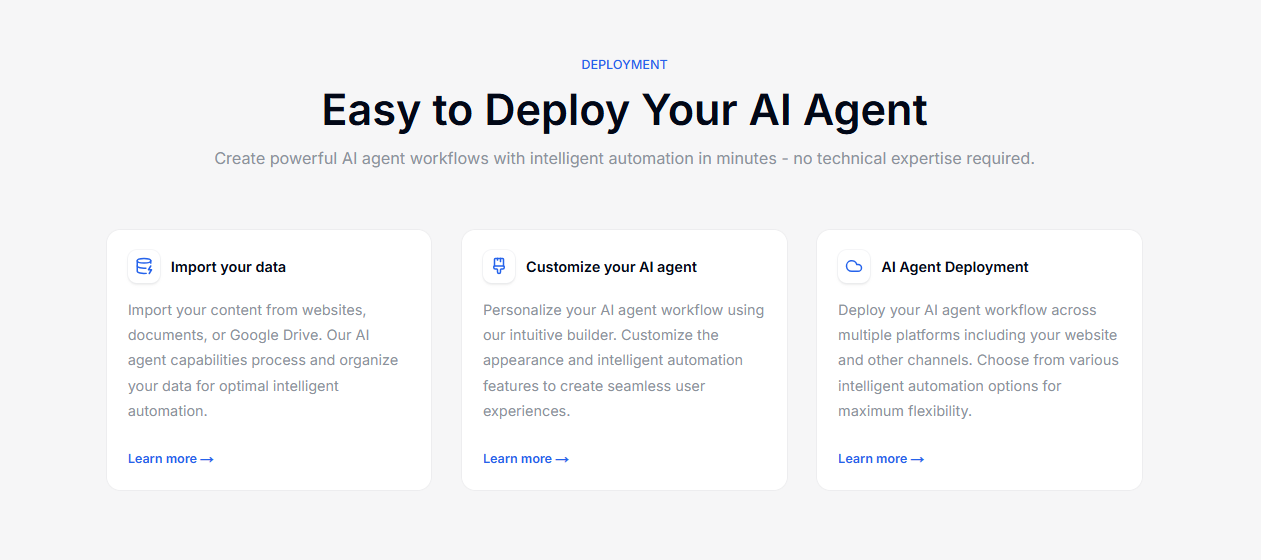
Request a product demo or sign up for a free trial with Denser today!
FAQs About AI Agent Tools#
What are AI agent tools?#
AI agent tools are software platforms that let you build and manage autonomous agents capable of handling tasks without constant oversight.
Unlike conventional AI models that focus on single outputs, these tools can plan, act, and adapt in real time, from answering support tickets to automating operations across your tech stack.
What are the five types of agents in AI?#
The five types of agents are:
- Simple reflex agents
- Model-based reflex agents
- Goal-based agents
- Utility-based agents
- Learning agents
When applied in business, these categories translate into tools that can respond reactively, understand behavior through data, optimize for goals, and continuously improve through experience.
The outcome is stronger agent performance, provided systems are secured with proper network security measures and supported by a reliable stack AI infrastructure.
What is the most popular AI agent?#
The most popular AI agents are frameworks like LangChain and AgentGPT, widely used by developers for building applications.
Enterprise-ready platforms such as Denser stand out because they give you full control over deployment, integration with other systems, and the ability to scale.
Popularity depends on whether you’re a technical user coding agents or a company looking for a packaged solution. For teams, features like shared access and unlimited seats make adoption easier across the entire company.
Is there a free AI agent?#
Yes, several platforms offer a free plan or trial. Denser provides DenserChat with basic usage included. Meanwhile, open-source options like AutoGen and CrewAI let you create agents without upfront licensing costs.
Some solutions also support web scraping, data handling, and API calls at no charge. But keep in mind that the true costs depend on usage volumes and the resources required to run these agents.